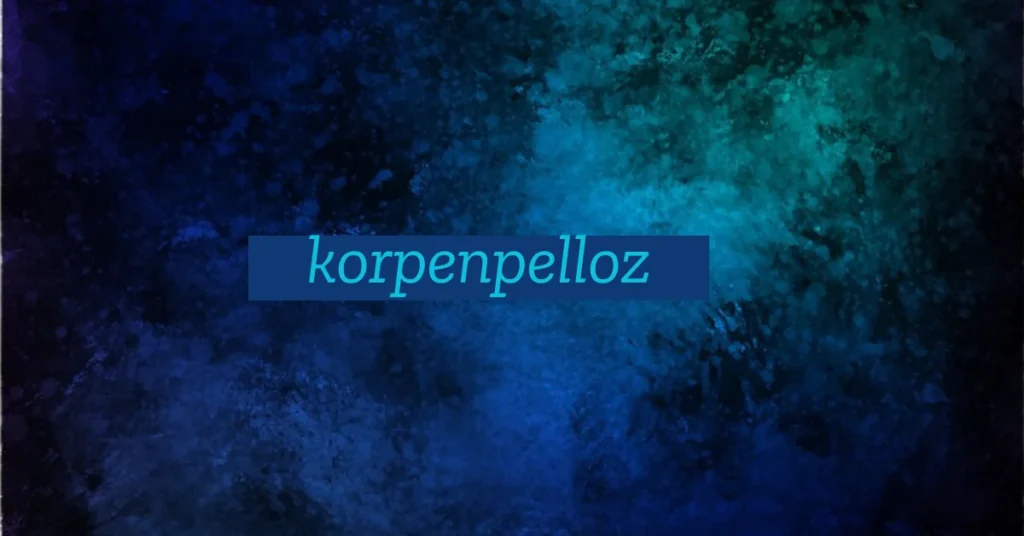Introduction to Korpenpelloz
Korpenpelloz is a term that might sound unfamiliar, but it represents a complex and often misunderstood condition. This unique ailment has intrigued medical professionals and researchers alike, prompting countless questions about its symptoms, origins, and treatments. As we delve deeper into the world of korpenpelloz, we’ll uncover the layers of mystery surrounding this illness. Whether you’re someone seeking information for yourself or a loved one—or simply curious—this exploration will shine a light on what is known and yet to be discovered. Join us as we unravel the enigma of korpenpelloz together!
History and Origin of Korpenpelloz
Korpenpelloz has a fascinating history that dates back several centuries. It is believed to have first emerged in isolated communities, where individuals exhibited peculiar symptoms. These reports piqued the interest of early medical practitioners and folklorists alike.
The name itself derives from ancient texts, hinting at a connection with local folklore. As more cases were documented, researchers began exploring its potential links to environmental factors or genetic predispositions.
Throughout the years, misconceptions surrounded korpenpelloz. Some viewed it solely as a myth while others considered it an actual medical condition. This duality fueled debates among scholars and healthcare professionals for generations.
The journey toward understanding korpenpelloz has been slow yet compelling. Each new finding sheds light on its complexities, drawing researchers into deeper inquiries about its true nature and impact on those affected by it.
Symptoms and Diagnosis
Korpenpelloz manifests through a variety of symptoms that can be perplexing. The most common signs include intense fatigue, joint pain, and occasional rashes. Individuals may also experience mood swings or unexplained anxiety.
Diagnosis can be equally challenging. Medical professionals often rely on a combination of physical examinations and patient history. Blood tests are crucial to rule out other conditions that mimic korpenpelloz symptoms.
In some cases, imaging studies like MRIs may help doctors understand the extent of inflammation in joints or tissues. A definitive diagnosis usually requires collaboration among specialists to connect the dots effectively.
Keeping a symptom diary is beneficial for individuals seeking answers. This record can provide valuable insights during consultations with healthcare providers. Early recognition and accurate diagnosis play pivotal roles in managing this complex condition.
Treatment Options for Korpenpelloz
When it comes to treating korpenpelloz, a multifaceted approach is often necessary. Healthcare providers typically recommend a combination of therapies tailored to the individual’s specific needs.
Medications can play a crucial role. Antidepressants or anti-anxiety medications may help manage symptoms effectively. These pharmacological options are aimed at improving overall mood and reducing feelings of distress.
Therapeutic interventions are equally important. Cognitive Behavioral Therapy (CBT) has shown promise in helping individuals cope with their experiences related to korpenpelloz. This therapy focuses on changing negative thought patterns and behaviors.
Lifestyle adjustments also contribute significantly. Regular exercise, balanced nutrition, and mindfulness practices can alleviate some symptoms associated with this condition.
Support groups provide an essential network for those affected by korpenpelloz. Sharing experiences fosters understanding and creates a sense of community among participants facing similar challenges.
Controversies Surrounding the Illness
Korpenpelloz has sparked considerable debate in the medical community. Some experts question its legitimacy as a distinct illness, arguing that symptoms may overlap with other conditions. This uncertainty can lead to misdiagnosis and ineffective treatment plans.
Patients often find themselves struggling for recognition. Many feel dismissed by healthcare providers who are skeptical about korpenpelloz’s existence as an independent entity. This skepticism adds another layer of frustration for those seeking help.
Additionally, there’s a lack of standardized diagnostic criteria, which fuels differing opinions on how korpenpelloz should be treated. The absence of clear guidelines results in varied approaches among practitioners, leaving patients confused about their options.
Social media plays a significant role in spreading awareness but also misinformation surrounding this illness. While it connects individuals facing similar challenges, some online narratives may exaggerate or misrepresent the condition’s severity or prevalence. Such discrepancies complicate public understanding and acceptance of korpenpelloz.
Coping with Korpenpelloz: Tips and Support Systems
Living with korpenpelloz can feel overwhelming at times. Finding the right support system is crucial for managing symptoms and maintaining a positive outlook.
Reach out to friends and family. Open conversations about your experiences can foster understanding. They may not grasp every detail, but emotional support goes a long way.
Consider joining online forums or local support groups dedicated to korpenpelloz. Here, you’ll find people who share similar struggles. Sharing stories and strategies can bring relief and validation.
Practicing mindfulness techniques also helps in coping. Meditation or yoga offers calming effects that ease anxiety associated with the condition.
Keep track of your symptoms in a journal as well. This can help identify triggers while providing an outlet for expression when feelings become intense.
Remember, seeking professional help isn’t a weakness; it’s an important step toward effective management of korpenpelloz.
Current Research and Future Outlook
Current research on korpenpelloz is rapidly evolving. Scientists are uncovering genetic markers that may play a role in its development. These discoveries could pave the way for more targeted therapies.
Clinical trials are also underway, exploring new medications and treatment protocols. Researchers are keen to understand how lifestyle factors impact symptoms and overall well-being.
Innovative approaches, such as mindfulness practices and dietary adjustments, show promise. Early results suggest these methods can improve quality of life for those affected.
The future outlook appears hopeful as collaboration among researchers grows stronger. Increased funding might lead to breakthroughs that were previously unimaginable.
As awareness spreads, more studies focusing on korpenpelloz will likely emerge, enhancing our understanding of this complex condition. The medical community remains committed to finding answers and improving patient care with each passing year.
Conclusion
Korpenpelloz remains an enigmatic and intriguing condition in the medical field. With its complex history, diverse symptoms, and varied treatment options, those affected face a unique journey. The controversies surrounding it highlight the ongoing debates among professionals about its recognition and management.
Support systems play a crucial role for individuals navigating this illness. Encouragement from peers and understanding friends can significantly improve emotional well-being. Furthermore, current research continues to shed light on korpenpelloz, paving the way for potential breakthroughs that could enhance diagnosis and treatment strategies.
Awareness is vital as we unravel more of korpenpelloz’s mysteries. By fostering dialogue around this condition, we not only empower those affected but also contribute to advancing knowledge in healthcare fields. As studies progress, there is hope that clarity will emerge from the complexity of korpenpelloz, bringing relief to many who seek answers.
ALSO READ: Eporer: Website Stats & Value Explained
FAQs
What is Korpenpelloz?
Korpenpelloz is a concept with deep historical and cultural significance, symbolizing transformation, wisdom, and innovation.
Where does the term Korpenpelloz originate from?
The exact origins remain uncertain, but it has appeared in various cultures, evolving in meaning over time.
How is Korpenpelloz relevant today?
In modern contexts, Korpenpelloz represents new ways of thinking, creativity, and the pursuit of hidden knowledge.
Is Korpenpelloz linked to any specific philosophy?
While not tied to a single philosophy, it embodies themes of change, enlightenment, and deeper understanding.
Why is Korpenpelloz considered mysterious?
Its evolving interpretations and varied cultural references keep it open to personal and philosophical exploration.







